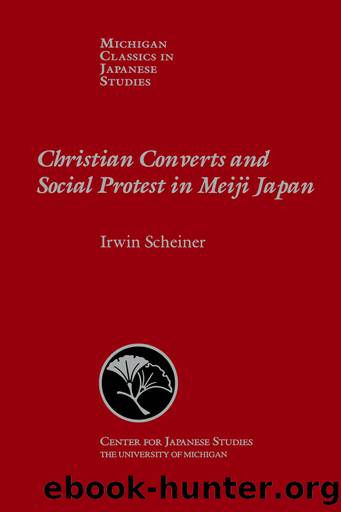Christian Converts and Social Protest in Meiji Japan by Irwin Scheiner

Author:Irwin Scheiner
Language: eng
Format: epub
Publisher: University of Michigan Center for Japanese Studies
Published: 2020-02-15T00:00:00+00:00
7
THE FOUNDING OF A SCHOOL AND THE CULTIVATION OF A NATION
TWO years after Niijima arrived in the United States, four of the most powerful tozama daimyÅ joined forces to overthrow the Tokugawa shogunate. At the same time that Niijima was entering his second semester at Amherst, Satsuma samurai were entering Edo, and shogunate and fudai retainers were scattering to their home domains. The first news of the rebellion reached Niijima at Amherst on February 21, 1868, the day before Washingtonâs birthday. There was civil war in Japan, he reported to Mrs. Hardy, and daimyÅ had risen against the shogun. He wrote that the shogunâs residence, only a short walk from his parentsâ home in Edo, had been burned by a mob of Satsuma samurai. âBut I do not feel anxious about my folks because I demand [sic] them under the protection of the Almighty Hand.â1 But news from Japan took only one paragraph of his letter. After all, he was living in America, and the next day he would celebrate a holiday, an American one. âThank you for the holiday and congratulations on the event,â he continued. âI salute you all for the day, for the gift of the hero to this nation, and for independence. I should like to see such freedom in my country.â2
Two months later, Niijima received a letter from his sister describing the confusion in Edo. His family was afraid that the city would be attacked, and his father wanted him to return home immediately. But Niijima refused to return on his fatherâs command. âI am not his [Niijimaâs fatherâs] own,â he wrote Mrs. Hardy. âHow can I go back now, having a plow on my hands. I must prepare myself for my Masterâs work.â3 Besides, he felt that this was not his war. âIf I go back now I suppose I need go to war. I do not wish at all to kill myself in such a barbarous war.â4 His war, Niijima wrote, was with Satan, and his weapons were âthe helmet of salvation and the sword of the spirit, which is the word of God.â5
Still, Niijima did want to return to Japan. He refused to return to fight in a barbarous war and he refused to return because of his fatherâs command, but he never refused to serve or aid his country. Indeed, shortly after hearing about the Restoration he wrote, âI want to do my utmost for Japan.â6 Even before the Restoration, he had joined a student missionary society on matriculation at Amherst and had declared that his ultimate objective was to return to Japan and there teach the gospel. What troubled him were the conditions under which he could return. This worry remained even after his father wrote of the great changes in the country, with âmost of the people of high ranks cut[ting] their hairs short and dressing] in the American styleâ and of talk that âthe educational system of the Western nations would soon be introduced.â7 Niijima had violated the Tokugawa proscription on leaving the country.
Download
This site does not store any files on its server. We only index and link to content provided by other sites. Please contact the content providers to delete copyright contents if any and email us, we'll remove relevant links or contents immediately.
| Africa | Americas |
| Arctic & Antarctica | Asia |
| Australia & Oceania | Europe |
| Middle East | Russia |
| United States | World |
| Ancient Civilizations | Military |
| Historical Study & Educational Resources |
The Third Pole by Mark Synnott(954)
Money for Nothing by Thomas Levenson(948)
The Economist (20210109) by calibre(937)
Christian Ethics by Wilkens Steve;(860)
Made in China by Anna Qu(855)
The Age of Louis XIV: The Story of Civilization by Will Durant(833)
Nonstate Warfare by Stephen Biddle(815)
Reopening Muslim Minds by Mustafa Akyol(813)
100 Posters That Changed The World by Salter Colin T.;(786)
The Shortest History of China by Linda Jaivin(779)
Culture by Terry Eagleton(776)
The Great Pyramid Void Enigma by Scott Creighton(761)
The Irish Buddhist by Alicia Turner(760)
Ideology by Eagleton Terry;(743)
Routledge Handbook of Contemporary India by Knut A. Jacobsen(742)
Sybille Bedford by Selina Hastings(690)
The Jews of Silence: A Personal Report on Soviet Jewry by Elie Wiesel(688)
Banaras: CITY OF LIGHT by Diana L. Eck(680)
Objects of Vision by Saab A. Joan;(670)
